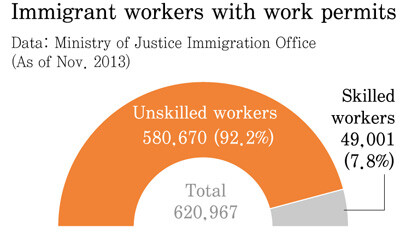hankyoreh
Links to other country sites 다른 나라 사이트 링크
Number of working foreigners in South Korea drops from 2016

The number of employed foreign residents in South Korea declined from last year amid restructuring in the manufacturing industry, statistics show. While most foreign workers in South Korea remain employed in jobs with low wages and long working hours, the number of professional workers has declined despite government policy efforts to attract them.
The Statistics Korea and the Ministry of Justice released findings on Dec. 20 from a 2017 survey of immigrant sojourn status and employment. The results showed a total of 1,225,000 international residents aged 15 and older staying in South Korea for a period of 91 days or longer as of May 2017, 834,000 of whom were employed. The number of foreigners staying in South Korea was up by 26,000 (2.1%) from the year before, but the number who were employed fell by 1,000 (1.0%). As a result, the employment rate for foreigners stood dropped 1.5 percentage points from its 2016 level to 68.1%.
“A decline in manufacturing employment due to restructuring in the shipbuilding industry was having a large sustained impact through May of this year, when the survey was conducted,” explained Bin Hyeon-jun, director of Statistics Korea’s employment statistics division.
“Indeed, the decline in employment for foreigners was larger in the shipbuilding centers of Busan, Ulsan, and South Gyeongsang Province than in other regions,” Bin said.

The survey consisted of a questionnaire administered in May to a sample of 11,000 foreigners, not including unregistered short-term foreign visitors. In contrast with previous surveys on foreigner employment, the survey included a broader-ranging examination of conditions in addition to questions about income and living environments.
The most common average monthly income range for foreign residents of South Korea last year was between 2,000,000 and 2,999,999 won (US$1,840–2,760), reported by 394,000 residents (32.2%). Another 365,500 (29.8%) earned in the 1,000,000–1,999,999 won (US$920–1,840) range, while 287,000 (23.4%) had no income. Only 96,200 (7.9%) had monthly incomes of 3,000,000 won (US$2,760) or more. Even among foreign wage earners, 738,000 were calculated as earning less than 3,000,000 won, or 89.6%. Foreigners were found to spend 40.7% of their earnings on living expenses and 24.9% on domestic and international remittances, followed 15.7% on savings and 12% on housing.
Fifty-one percent of foreign wage earners described their work as “simple and repetitive,” while 31.7% said their work “required some practical knowledge and skill.” Because so many are employed in low-wage, low-skill duties, the number suffering from long working hours and uncertain employment has actually been on the rise. The number of foreign employees working 60 or more hours a week rose by 14.8% from 208,600 in 2016 to 239,400 this year.
The number employed in full-time positions fell by 22,000 (4.3%) from 515,000 to 493,000 over the same period, while the number working in temporary positions and day labor rose by 19,000 (6.8%) from 287,000 to 306,000.
In contrast, just 8% of respondents said their work required “expert-level knowledge and skill.” Indeed, the number of employed foreign residents with professional employment visas declined from 39,600 in 2016 to 38,200 this year. The figures suggest the South Korean government’s policies to shift the focus of foreign migration from non-professional and simple labor to a professional workforce – including its April plan for attracting “outstanding overseas talents” – have yet to pay off.
“The more foreign labor takes place in poor working environments and focuses on low-skill duties, the more working conditions tend to deteriorate as well for the unskilled domestic workers in competition with them,” said KDI human resource development policy department chief Choi Kyung-soo.
By Bang Jun-ho, staff reporter
Please direct questions or comments to [english@hani.co.kr]

Editorial・opinion
![[Column] Season 2 of special prosecutor probe may be coming to Korea soon [Column] Season 2 of special prosecutor probe may be coming to Korea soon](https://flexible.img.hani.co.kr/flexible/normal/500/300/imgdb/original/2024/0426/3317141030699447.jpg) [Column] Season 2 of special prosecutor probe may be coming to Korea soon
[Column] Season 2 of special prosecutor probe may be coming to Korea soon![[Column] Park Geun-hye déjà vu in Yoon Suk-yeol [Column] Park Geun-hye déjà vu in Yoon Suk-yeol](https://flexible.img.hani.co.kr/flexible/normal/500/300/imgdb/original/2024/0424/651713945113788.jpg) [Column] Park Geun-hye déjà vu in Yoon Suk-yeol
[Column] Park Geun-hye déjà vu in Yoon Suk-yeol- [Editorial] New weight of N. Korea’s nuclear threats makes dialogue all the more urgent
- [Guest essay] The real reason Korea’s new right wants to dub Rhee a founding father
- [Column] ‘Choson’: Is it time we start referring to N. Korea in its own terms?
- [Editorial] Japan’s rewriting of history with Korea has gone too far
- [Column] The president’s questionable capacity for dialogue
- [Column] Are chaebol firms just pizza pies for families to divvy up as they please?
- [Column] Has Korea, too, crossed the Rubicon on China?
- [Correspondent’s column] In Japan’s alliance with US, echoes of its past alliances with UK
Most viewed articles
- 1[Column] Season 2 of special prosecutor probe may be coming to Korea soon
- 2‘We must say no’: Seoul defense chief on Korean, USFK involvement in hypothetical Taiwan crisis
- 3Is N. Korea threatening to test nukes in response to possible new US-led sanctions body?
- 4No good, very bad game for Korea puts it out of Olympics for first time since 1988
- 5Is Japan about to snatch control of Line messenger from Korea’s Naver?
- 6Division commander ordered troops to enter raging flood waters before Marine died, survivor says
- 7Korea’s 1.3% growth in Q1 signals ‘textbook’ return to growth, says government
- 8N. Korean delegation’s trip to Iran shows how Pyongyang is leveraging ties with Moscow
- 9[Editorial] Korea’s surprise Q1 growth requires objective assessment, not blind fanfare
- 10[Editorial] Government needs to stop impeding Sewol mourning